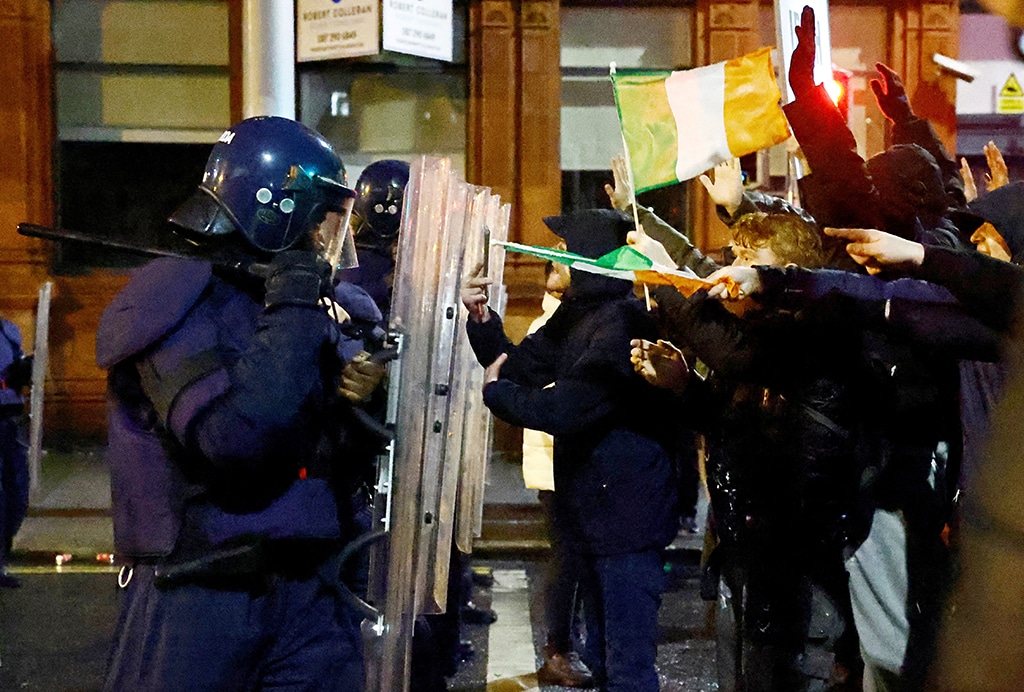Irish Prime Minister Leo Varadkar said on Friday it was safe to return to Dublin city centre after police made 34 arrests following overnight rioting that was triggered by the stabbing of three young children in the street.
Irish police have warned that further violence could follow after rioters smashed shop windows, set fire to police cars, buses and a tram, and clashed with officers in violence rarely seen in the Irish capital.
Shoppers and tourists returned on Black Friday morning, walking past police officers guarding looted stores and patrolling the area in large numbers. Burnt out vehicles were removed.
“Those involved brought shame on Dublin, brought shame on Ireland and brought shame on their families and themselves,” Varadkar told a news conference.
“Our advice is that it is safe to come into the city. The riots that occurred last night only occurred in a relatively small part of it, thankfully, and were contained within hours.”
A five-year-old girl remained in a critical condition on Friday following emergency treatment for serious injuries sustained in the stabbing, which happened near a school and beside the main thoroughfare of O’Connell Street.
Police, who say they have not ruled out any motive including whether it was terror-related, have not commented on the nationality of a man detained in connection with the stabbings but there was immediate speculation online that he was foreign.
Police blamed far-right agitators for starting the violence after a small group of anti-immigrant protesters arrived at the scene of the stabbing and clashed with police.
Varadkar said his government would take immediate steps to tighten anti-hate legislation he said was unfit for the social media age.
“As a country we need to reclaim Ireland. We need to take it away from the cowerers who hide behind masks and try to terrify us with their violence,” Varadkar said earlier on Friday, in an emotional statement.
‘ELEMENT OF RADICALISATION’
The attack was condemned across all political parties, including the main opposition Sinn Fein.
Police Commissioner Drew Harris told a news conference the scenes in the city were unprecedented, adding there would be a very heavy police presence on Friday.
“I think that we’ve seen an element of radicalisation. We have seen a group of people who take literally a thimble full of facts and make a bathtub of hateful assumptions and then conduct themselves in a way which is riotous and disruptive to our society.”
It took officers several hours to regain control after a group of local youths joined the protesters, some of whom were shouting “get them out”, with one carrying a sign saying “Irish Lives Matter”. The crowd grew to about 200 to 300 people.
British minister Michael Gove, in Dublin for a meeting with Varadkar, told reporters the violence had been shocking. “It’s a mark of Ireland that this sort of thing is so rare,” he said.
People were urged to stay away from large parts of the city during the height of the violence. Harris said 13 shops were damaged or looted, 11 police cars damaged and destroyed along with three buses and a tram. One officer was seriously injured.
Barricades which went up across some shopping streets where Black Friday sales were due to take place had been removed by lunchtime.
“We don’t know if this will happen again tonight. Right now we are feeling worried,” said Hassan Alia, a Foot Locker security guard standing outside the shuttered store who was also working on Thursday night.
Members of the public intervened at an early stage of the attack, including a Brazilian Deliveroo driver who told the Journal website that he knocked the assailant to the ground by striking him with his helmet.
Harris said the injured girl remained in a very serious condition with a female teacher in her 30s also in a serious condition. The two other children, a five-year-old boy and six-year-old girl, suffered less serious injuries.
The man in his late 40s, also being treated for serious injuries, was detained by police who said they were not looking for any other suspect.
There are no far-right parties elected to Ireland’s parliament, but small anti-immigrant protests have grown in the last year. The government is reviewing security around parliament after a recent protest trapped lawmakers inside.







Click here to change your cookie preferences